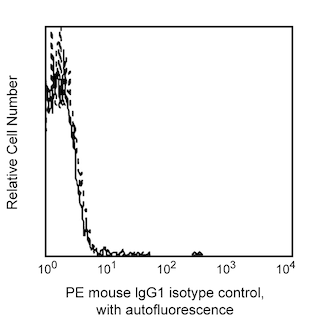-
Your selected country is
Middle East / Africa
- Change country/language
Old Browser
This page has been recently translated and is available in French now.
Looks like you're visiting us from {countryName}.
Would you like to stay on the current country site or be switched to your country?


.png)

Flow cytometric analysis of Vγ9 TCR expression on human peripheral blood lymphocytes. Whole blood was stained with PE Mouse Anti-Human Vγ9 TCR (Cat. No. 555733) and FITC Mouse Anti-Human CD3 (Cat. No. 561807/561806/555332). Erythrocytes were lysed with BD PharmLyse™ Lysing Buffer (Cat. No. 555899). Fluorescent two-color contour plot was derived from gated events with the forward and side light-scattering characteristics of viable lymphocytes. Flow cytometry was performed on a BD FACScan™ system.
.png)

BD Pharmingen™ PE Mouse Anti-Human Vγ9 TCR
.png)
Regulatory Status Legend
Any use of products other than the permitted use without the express written authorization of Becton, Dickinson and Company is strictly prohibited.
Preparation And Storage
Product Notices
- Since applications vary, each investigator should titrate the reagent to obtain optimal results.
- An isotype control should be used at the same concentration as the antibody of interest.
- Caution: Sodium azide yields highly toxic hydrazoic acid under acidic conditions. Dilute azide compounds in running water before discarding to avoid accumulation of potentially explosive deposits in plumbing.
- For fluorochrome spectra and suitable instrument settings, please refer to our Multicolor Flow Cytometry web page at www.bdbiosciences.com/colors.
- Please refer to www.bdbiosciences.com/us/s/resources for technical protocols.
Companion Products





The B3 monoclonal antibody specifically recognizes the human variable γ9 subunit (Vγ9) of γ/δ T-cell receptor (TCR). The γ/δ TCR is composed of two disulfide-linked glycoproteins. The gamma chain is approximately 45-60 kD and is detected on a small subset peripheral blood T cells and thymocytes. The majority of normal peripheral blood γ/δ T cells express a Vγ9+/Vδ2+ phenotype. The reason for this selection in the T-cell repertoire is not well understood.

Development References (3)
-
Barclay NA, Brown MH, Birkeland ML, et al, ed. The Leukocyte Antigen FactsBook. San Diego, CA: Academic Press; 1997.
-
Breit TM, Wolvers-Tettero IL, van Dongen JJ. Receptor diversity of human T-cell receptor gamma delta expressing cells. Prog Histochem Cytochem. 1992; 26(1-4):182-193. (Biology). View Reference
-
Kabelitz D. Function and specificity of human gamma/delta-positive T cells. Crit Rev Immunol. 1992; 11(5):281-303. (Biology). View Reference
Please refer to Support Documents for Quality Certificates
Global - Refer to manufacturer's instructions for use and related User Manuals and Technical data sheets before using this products as described
Comparisons, where applicable, are made against older BD Technology, manual methods or are general performance claims. Comparisons are not made against non-BD technologies, unless otherwise noted.
For Research Use Only. Not for use in diagnostic or therapeutic procedures.
Report a Site Issue
This form is intended to help us improve our website experience. For other support, please visit our Contact Us page.